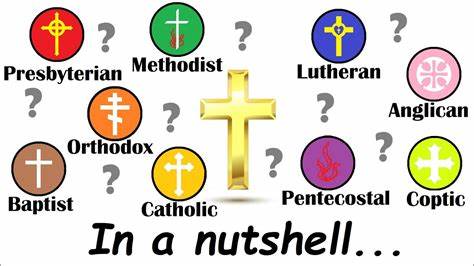The presence of numerous Christian denominations today reflects a history marked by diversity in thought, interpretation, and practice. This has been shaped by various movements, most notably the Protestant Reformation, which sought to challenge and reform the dominant Roman Catholic Church during the 16th century. As different theological ideas emerged, they gradually formed distinct denominations, each with unique perspectives, even as they remained rooted in the core message of Christ.
The Protestant Reformation led to the formation of four main traditions: Lutheran, Reformed, Anabaptist, and Anglican. Martin Luther’s ideas laid the foundation for the Lutheran denomination, emphasizing salvation by faith alone, while the Reformed tradition, led by figures like John Calvin, highlighted God’s sovereignty. Anglicanism, developed in England, and the Anabaptist tradition, which advocated adult baptism, also arose during this time, further contributing to the diversity within the Christian faith. Over time, these movements branched out, giving birth to other well-known groups like Baptists, Methodists, and Presbyterians, each with slightly different emphases in belief and worship practices.
The variations between denominations often arise from differing interpretations of Scripture. For instance, Baptists emphasize the baptism of believers who can make a personal profession of faith, while Anglicans and Presbyterians practice infant baptism as part of a covenantal understanding of faith. Likewise, the Lord’s Supper is viewed differently among denominations: some see it as purely symbolic, while others believe it carries a deeper spiritual significance. Other doctrinal issues, such as the nature of salvation—whether it is driven by God’s sovereignty or human free will—also contribute to denominational differences. These variations, while distinct, all share a common devotion to the gospel of Christ.
Beyond theological differences, cultural and regional influences have also shaped Christian denominations. As Christianity spread globally, it absorbed and adapted to local customs and societal conditions. A Presbyterian church in Africa may have a different worship style than one in Europe, yet they share core beliefs. Historical events have further shaped these differences. The Anglican Church, for example, arose from a political split with the Roman Catholic Church in England. Similarly, the African Methodist Episcopal (AME) Church in the United States was born out of the need for an independent Black Christian community in response to racial oppression.
The diversity of denominations offers believers a broad spectrum of worship experiences that can align with their personal faith journey. Christians can choose a church community that reflects their doctrinal understanding and worship preferences. This diversity can enrich the church as a whole, allowing for expressions of faith that resonate with different cultural contexts and individual needs.
However, the presence of so many denominations also brings challenges. Theological disputes have sometimes led to division rather than unity. In certain cases, denominational differences foster a sense of rivalry, with some groups perceiving themselves as superior to others. Such divisions can weaken the church’s collective mission to present a unified witness to the world. Rather than seeing diversity as a strength, the fractured state of the church may be perceived by outsiders as a sign of disunity.
Despite these challenges, it is vital for Christians to focus on what unites them: the core message of the gospel. The death and resurrection of Jesus Christ, the importance of personal faith, and the call to love and serve others should remain the primary focus for all believers. Denominations may offer different approaches to worship and doctrine, but the shared foundation in Christ must transcend those differences. By embracing diversity without losing sight of unity, the global church can better fulfill its mission.
In the end, while denominations reflect the rich variety of Christian expression, all believers are ultimately one body in Christ. The goal should always be to respect and learn from different traditions while fostering unity and love within the broader Christian community.







Discussion about this post